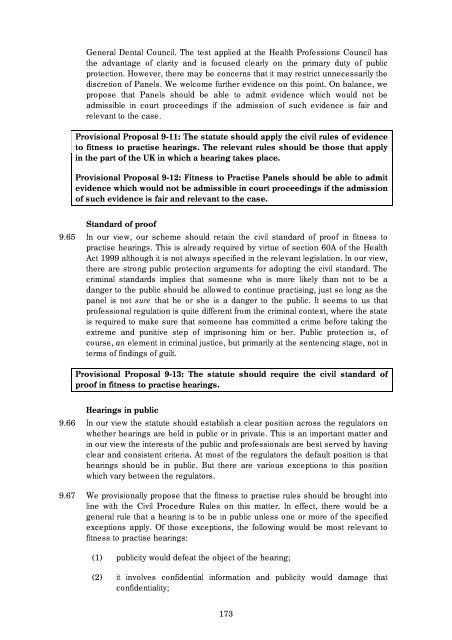Regulation of Health and Social Care Professionals Consultation
Regulation of Health and Social Care Professionals Consultation
Regulation of Health and Social Care Professionals Consultation
Create successful ePaper yourself
Turn your PDF publications into a flip-book with our unique Google optimized e-Paper software.
General Dental Council. The test applied at the <strong>Health</strong> Pr<strong>of</strong>essions Council has<br />
the advantage <strong>of</strong> clarity <strong>and</strong> is focused clearly on the primary duty <strong>of</strong> public<br />
protection. However, there may be concerns that it may restrict unnecessarily the<br />
discretion <strong>of</strong> Panels. We welcome further evidence on this point. On balance, we<br />
propose that Panels should be able to admit evidence which would not be<br />
admissible in court proceedings if the admission <strong>of</strong> such evidence is fair <strong>and</strong><br />
relevant to the case.<br />
Provisional Proposal 9-11: The statute should apply the civil rules <strong>of</strong> evidence<br />
to fitness to practise hearings. The relevant rules should be those that apply<br />
in the part <strong>of</strong> the UK in which a hearing takes place.<br />
Provisional Proposal 9-12: Fitness to Practise Panels should be able to admit<br />
evidence which would not be admissible in court proceedings if the admission<br />
<strong>of</strong> such evidence is fair <strong>and</strong> relevant to the case.<br />
St<strong>and</strong>ard <strong>of</strong> pro<strong>of</strong><br />
9.65 In our view, our scheme should retain the civil st<strong>and</strong>ard <strong>of</strong> pro<strong>of</strong> in fitness to<br />
practise hearings. This is already required by virtue <strong>of</strong> section 60A <strong>of</strong> the <strong>Health</strong><br />
Act 1999 although it is not always specified in the relevant legislation. In our view,<br />
there are strong public protection arguments for adopting the civil st<strong>and</strong>ard. The<br />
criminal st<strong>and</strong>ards implies that someone who is more likely than not to be a<br />
danger to the public should be allowed to continue practising, just so long as the<br />
panel is not sure that he or she is a danger to the public. It seems to us that<br />
pr<strong>of</strong>essional regulation is quite different from the criminal context, where the state<br />
is required to make sure that someone has committed a crime before taking the<br />
extreme <strong>and</strong> punitive step <strong>of</strong> imprisoning him or her. Public protection is, <strong>of</strong><br />
course, an element in criminal justice, but primarily at the sentencing stage, not in<br />
terms <strong>of</strong> findings <strong>of</strong> guilt.<br />
Provisional Proposal 9-13: The statute should require the civil st<strong>and</strong>ard <strong>of</strong><br />
pro<strong>of</strong> in fitness to practise hearings.<br />
Hearings in public<br />
9.66 In our view the statute should establish a clear position across the regulators on<br />
whether hearings are held in public or in private. This is an important matter <strong>and</strong><br />
in our view the interests <strong>of</strong> the public <strong>and</strong> pr<strong>of</strong>essionals are best served by having<br />
clear <strong>and</strong> consistent criteria. At most <strong>of</strong> the regulators the default position is that<br />
hearings should be in public. But there are various exceptions to this position<br />
which vary between the regulators.<br />
9.67 We provisionally propose that the fitness to practise rules should be brought into<br />
line with the Civil Procedure Rules on this matter. In effect, there would be a<br />
general rule that a hearing is to be in public unless one or more <strong>of</strong> the specified<br />
exceptions apply. Of those exceptions, the following would be most relevant to<br />
fitness to practise hearings:<br />
(1) publicity would defeat the object <strong>of</strong> the hearing;<br />
(2) it involves confidential information <strong>and</strong> publicity would damage that<br />
confidentiality;<br />
173
















